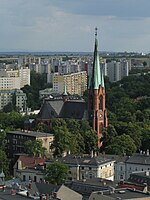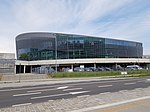Gliwice County

Gliwice County (Polish: powiat gliwicki) is a unit of territorial administration and local government (powiat) in Silesian Voivodeship, southern Poland. It came into being on January 1, 1999, as a result of the Polish local government reforms passed in 1998. Its administrative seat is the city of Gliwice, although the city is not part of the county (it constitutes a separate city county). The county contains four towns: Knurów, 8 km (5 mi) south of Gliwice, Pyskowice, 12 km (7 mi) north of Gliwice, Toszek, 22 km (14 mi) north-west of Gliwice, and Sośnicowice, 10 km (6 mi) west of Gliwice. The county covers an area of 663.35 square kilometres (256.1 sq mi). As of 2019 its total population is 115,571. The most populated towns are Knurów with 38,310 inhabitants and Pyskowice with 18,432 inhabitants.
Excerpt from the Wikipedia article Gliwice County (License: CC BY-SA 3.0, Authors, Images).Gliwice County
Cichociemnych, Gliwice Trynek
Geographical coordinates (GPS) Address Nearby Places Show on map
Geographical coordinates (GPS)
| Latitude | Longitude |
|---|---|
| N 50.283333333333 ° | E 18.666666666667 ° |
Address
Zakład Lecznictwa Podstawowego i Specjalistycznego ”Medicor” Spółka z o.o.
Cichociemnych 14
44-100 Gliwice, Trynek
Poland
Open on Google Maps










